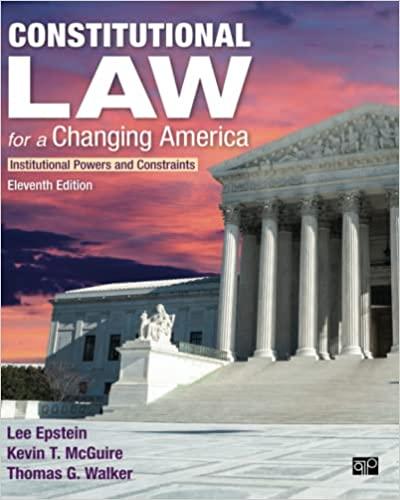Question
Read the case Parks v. Steak & Ale of Texas, Inc. and BREIFLY explain what happened in the case FACT: CONCLUSION: In his petition, appellant
Read the case Parks v. Steak & Ale of Texas, Inc. and BREIFLY explain what happened in the case
FACT:
CONCLUSION:
In his petition, appellant alleged the following: on November 29, 2001, he and his son ate at a Steak & Ale restaurant; he returned to his table from the restroom after eating his meal; he sat down in his chair, which collapsed forward; and he fell forward, hit his chin on the table, and jammed his right wrist into the wall. Appellant further alleged that he sustained severe injuries to his neck and wrist that required surgical intervention. There were no witnesses to this incident other than appellant s ten-year-old son
The restaurant manager, Greg Lacy, inspected the chair and noted that the front right leg of the chair had broken off where the leg connects to the frame. This type of chair, according to Lacy s testimony, is approximately five feet high, measured from the floor to the top of the back of the chair, and weighs about seventy-five pounds. Lacy stated in his deposition testimony that this type of chair is sturdy. He further testified that if the fabric of a chair tears or becomes loose, he has it repaired, but that if anything happens to the chair structure, he destroys it. He stated that he had approximately 22 of these high-backed chairs in the restaurant and that he had not had to replace any of them in the two years he had been general manager of the restaurant
Appellant testified at his deposition that a friend took him to the Cy-Fair Hospital emergency room the day after the incident at Steak & Ale because appellant was experiencing pain and a severe headache. Appellant s CAT scan results were normal, and the examining physician found no broken bones. Appellant was instructed to go home and rest. Appellant testified that, although the doctor told him nothing had been broken, appellant continued to experience discomfort and pain and was not able to work. A few weeks later, appellant visited his family practitioner and a hand specialist. Approximately eight months later, appellant filed this suit against Steak & Ale. Steak & Ale filed a no-evidence motion for summary judgment to challenge appellant s claims of negligence and strict products liability. The trial court granted Steak & Ale s motion. In two issues, appellant appeals the judgment on both of his causes of action.
To rely on res ipsa loquitur to establish negligence, a plaintiff must show (1) that the character of the injury is such that it would not have ordinarily occurred without negligence and (2) that the instrumentality causing the injury was under the management and control of the defendant
The chair at issue in this case was in the dining room of a restaurant. It was undoubtedly used by many people each day and was therefore not under the sole control of the restaurant. Thus, it is possible that the chair was broken or damaged by someone not employed by the restaurant.
Step by Step Solution
There are 3 Steps involved in it
Step: 1

Get Instant Access to Expert-Tailored Solutions
See step-by-step solutions with expert insights and AI powered tools for academic success
Step: 2

Step: 3

Ace Your Homework with AI
Get the answers you need in no time with our AI-driven, step-by-step assistance
Get Started


